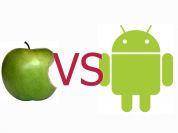Is the Google Android or Apple iOS more secure?

Which is more secure, mobile devices based on Google Android or Apple iOS? It's not just a theoretical question to IT professionals making decisions about the future use of smartphones and tablets in the enterprise.
Apple's locked-down approach in iOS has given it something of an edge in the debate, especially since Android's more open platform is being targeted by malware writers. Hardly a week goes by that security vendors hunting Android malware don't remind us of the growing tally, as Trend Micro recently did it claiming that Android malware surged this year from 30,000 specimens in June to almost 175,000 in September.
But on Android's side, security experts point out that the closed, proprietary iOS architecture has some drawbacks, such as when an iOS device is "jailbroken," its security shield is basically broken. Android's inherent openness and flexibility, something missing from iOS, is making it attractive as a platform for organizations considering customization of security the way they want it.
"You can build more security for Android," notes Tom Kellermann, vice president of cybersecurity at Trend Micro, who points out Android's open API model is conducive for that. But he notes that for now, at least, Google Android is also viewed as more vulnerable. In a study that Trend Micro did of security of the three mobile platforms iOS, Android and RIM BlackBerry, BlackBerry actually came out on top in that, he points out.
Worries about possibly having to cope with Android malware on either corporate-owned devices or Bring Your Own Device (BYOD) situations seems to be swaying a number of information-technology managers to vote 'yes' on iOS, 'no' on Android.
New York-based Blackstone Group feels much the same, according to CTO Bill Murphy. And in the healthcare environment, such as hospitals where use of tablets and other mobile devices under BYOD arrangements with healthcare professionals is surging, the same reservations about Android are voiced.
"We tested Android and we think it's more vulnerable than iOS," says Barak Shrefler, the IT and security manager at Hadassah University Hospital in Jerusalem, who said IT staff are concerned that malware or vulnerability issues around Android will simply result in future headaches, at least more than Apple iOS. At the same time, Shrefler acknowledges he's worried about jailbroken iOS devices, too.
Tamir Hardof, director of product marketing at Juniper, admitting he's reluctant to take sides, nevertheless said "data shows there are more security threats on the Android side." But he added that Apple's closed system may not be what's preferred for some enterprise customers with specific security requirements, and he's optimistic in general that "security will improve for Android devices."
Chris Astacio, Websense manager of security research, also weighed in. "In the ongoing discussion of whether iOS or Android devices are more secure, the overwhelming majority of evidence helps to support Apple's case for supremacy," says Astacio. Why? "The iOS closed operating system and application vetting process help prevent a vast majority of the successful malicious examples we have seen in Android devices."
https://www.networkworld.com/news/2012/120312-argument-ios-android-264570.html


